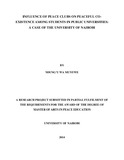| dc.description.abstract | Peace clubs are a student initiative whose aim is to create a responsible and young generation
through a culture of dialogue. Peace clubs are student based organizations. The clubs aim at
creating a peaceful and harmonious academic environment where students of diverse
backgrounds live inter dependently. Peace clubs’ work is based on the objectives and principles
of peace education and these clubs have been found to be useful as an instrument for conflict
resolution. This is because Peace Education is a process used to change attitudes and behaviour
by teaching skills that equip youths with the ability to use non-violent approaches when dealing
with conflict. Our study will determine the influence of adoption of peace clubs on peaceful coexistence among students in public universities by looking at peace club activities, composition
of peace clubs, training and funding of peace activities. This study will use descriptive survey
design. The target population of this study consists of members from 4 peace clubs at the
University of Nairobi. Data will be collected by means of interviews and administering of
questionnaires and data will be analyzed using the Statistical Package for Social Science. Among
the major findings of the study were that most clubs are not funded despite the fact that they
promote peacefully coexistent. The study suggests that s Universities should adopt a holistic and
integral approach in promoting peaceful co-existence by encouraging peace clubs to engage their
members and other students in meaningful activities such as dramatization, miming, singing,
poetry, projects and exchanges to heighten local, national and global awareness of individual,
cultural and religious differences. The more students are exposed to activities that promote
positive images of other people’s culture, religion, uniqueness, social identity etc, the less they
are likely to find faults with one another and the more they are able to live and work together for
the benefits of mankind and for the good of the society | en_US |

